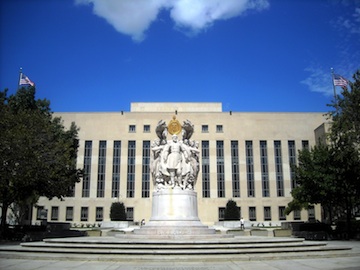Public Knowledge, Benton to Court: States Can Regulate Broadband Rates
File amicus brief in ISP challenge to low-cost broadband mandate law

The smarter way to stay on top of broadcasting and cable industry. Sign up below
You are now subscribed
Your newsletter sign-up was successful
Public Knowledge and the Benton Institute for Broadband and Society have filed an amicus brief in the U.S. Court of Appeals for the Second Circuit, which is hearing an appeal of a lower court injunction against a New York state law that would mandate affordable broadband.
Back in June, a lower court issued an injunction that temporarily blocks enforcement of the law--which requires ISPs to provide low-cost broadband to low-income households--and signaled that the ISPs are likely to win the underlying case that the law should not go into effect at all.
ISPs--including ACA Connects--argued that the low-cost mandate is a form of common carrier regulation that conflicts with the FCC's most recent decision that internet access is a Title I information service not subject to common carriers regs, and so the New York State law is preempted. Judge Denis R. Hurley of the U.S. District Court for the Eastern District of New York agreed. "To be clear, the ABA is rate regulation, and rate regulation is a form of common carrier treatment," he said in granting the June injunction.
Public Knowledge and Benton argue in their brief that the state's move to ensure affordable broadband access for New Yorkers is an important public policy goal, that the law is not preempted by federal law "under any theory or preemption," telling the court: "Far from Congress attempting to preempt or preclude state action, the Communications Act clearly anticipates, and even encourages, states to join in the regulation of communications services."
That includes rate regulation, they argue, over which the FCC has given up any say in the matter after it reclassified broadband as a Title I information service and effectively gave up control over internet access. "Significantly, this reclassification decision ceded FCC authority for any form of rate regulation. Upon review by the D.C. Circuit, the court determined that FCC lacked authority to preempt the states in areas like rate regulation where the FCC had ceded its authority."
Specifically, the Affordable Broadband Act, which was to have gone into effect June 15, would require ISPs in the state to offer low-income households high-speed broadband--at least 25 Mbps download speeds--for $15 per month, or of 200 Mbps for no more than $20. About 2.7 million households would qualify, or more than a third of all the households in New York. The service has to be offered as a standalone and must be advertised and promoted so people know it is available."
At her nomination hearing for the third Democratic seat on a five-member FCC, Gigi Sohn, former head of Public Knowledge, said she was not in favor of broadband rate regulation, but did not agree that low-cost broadband requirements in new broadband subsidies under the Biden Administration were the same thing.
As to the need for low-cost broadband mandates, ISPs are already offering a variety of low-cost broadband plans using the FCC's Lifeline broadband subsidies, and will be offering more with billions of dollars of COVID-19 and broadband infrastructure aid money.
Also: Biden Broadband Billions Will Boost Small Business
ISPs who also challenged the law included CTIA, The New York State Telecommunications Association, USTelecom, NTCA-the Rural Broadband Association, and the Satellite Broadcasting & Communications Association. NCTA did not, pointing out that "plenty of others" already had. ■
The smarter way to stay on top of broadcasting and cable industry. Sign up below
Contributing editor John Eggerton has been an editor and/or writer on media regulation, legislation and policy for over four decades, including covering the FCC, FTC, Congress, the major media trade associations, and the federal courts. In addition to Multichannel News and Broadcasting + Cable, his work has appeared in Radio World, TV Technology, TV Fax, This Week in Consumer Electronics, Variety and the Encyclopedia Britannica.

